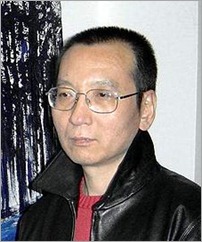 刘晓波 (Liu Xiaobo) helped write Charter 08.
刘晓波 (Liu Xiaobo) helped write Charter 08.
Preamble
This year is the 100th year of China’s Constitution, the 60th anniversary of the Universal Declaration of Human Rights, the 30th anniversary of the birth of the Democracy Wall, and the 10th year since China signed the International Covenant of Civil and Political Rights. After experiencing a prolonged period of human rights disasters and a tortuous struggle and resistance, the awakening Chinese citizens are increasingly and more clearly recognizing that freedom, equality, and human rights are universal common values shared by all humankind, and that democracy, a republic, and constitutionalism constitute the basic structural framework of modern governance. A “modernization” bereft of these universal values and this basic political framework is a disastrous process that deprives humans of their rights, corrodes human nature, and destroys human dignity. Where will China head in the 21st century? Continue a “modernization” under this kind of authoritarian rule? Or recognize universal values, assimilate into the mainstream civilization, and build a democratic political system? This is a major decision that cannot be avoided…
Perhaps one day he will be a national hero. Today, however, he is on trial: Diplomats kept out as China tries dissident.
A prominent Chinese dissident was tried on subversion charges yesterday after he called for sweeping political reforms and an end to Communist Party dominance, and his brother-in-law said a verdict would be handed down tomorrow.
Liu Xiaobo was detained a year ago, just before the release of an unusually direct appeal for political liberalisation he had helped to write called Charter 08. More than 300 people, including some of China’s top intellectuals, signed before it was released.
The defendant’s brother-in-law, Liu Hui, said yesterday’s trial lasted about two hours and that prosecutors accused him of ”serious” crimes. He said the verdict would come tomorrow, in what would be the latest example of authorities moving against activists around Western holidays, a pattern rights groups say is aimed at having the prosecutions avoid attention…
I am more than usually interested as I have met the man.
See also Liu Xiaobo on Civil Rights and Ideology on Zona Europa/EastSouthWestNorth, a very interesting site Marcellous introduced me to some time ago.
I met Liu Xiaobo in Sydney when he was visiting in the 1990s, between Tiananmen and the 1996 Labour Camp experience. He is one feisty individual, I can tell you. His call on the significance of the Chinese backdown is true enough, I suspect. It is however good to see the Cultural Revolution rhetoric going on the back burner for the moment. Despite the positive television images the Chinese government, which no doubt facilitated the amazing number of red flags, helped generate in Canberra the other day, it would appear that the Tibet protest message has had some effect on some in Beijing. Whatever else, the government and people in China do want to have a successful Olympics, partly on grounds quite familiar to us in Australia from the 2000 Olympics where many took a very dim view indeed of attempts to link the Olympics to publicising Aboriginal issues. In no way am I commending China’s human rights record, especially but not only in Tibet, I hasten to add. If ever anyone had first hand knowledge of that it is Liu Xiaobo.
“A Chinese court has sentenced leading dissident Liu Xiaobo to 11 years in prison for subversion, prompting the United States to accuse China of persecuting its political opponents.
Liu, 53, had previously been jailed over the 1989 Tiananmen pro-democracy protests, and has been tried again for “inciting subversion of state power” after he co-authored a book calling for political reform last year.
Charter 08, which calls for human rights protection and the reform of China’s one-party communist system, has been signed by more than 10,000 people, according to activist network China Human Rights Defenders.
One of Liu’s lawyers, Ding Xikui, says he is unsure whether Liu, who has already been detained for a year, will appeal.
Liu faces a maximum prison term of 15 years.”
There are several other reasons for Liu’s sentence other than the commonly known “no freedom of expression”.
Western nations’ involvement has also complicated the issue.
China has its own approach to democracy; the West is bias as it sees the “communists’ way of democracy still as communism”.
I have written an article on this issue:
http://thecriticalangle.wordpress.com
Pingback: 2010 Nobel Peace Prize « Neil's second decade